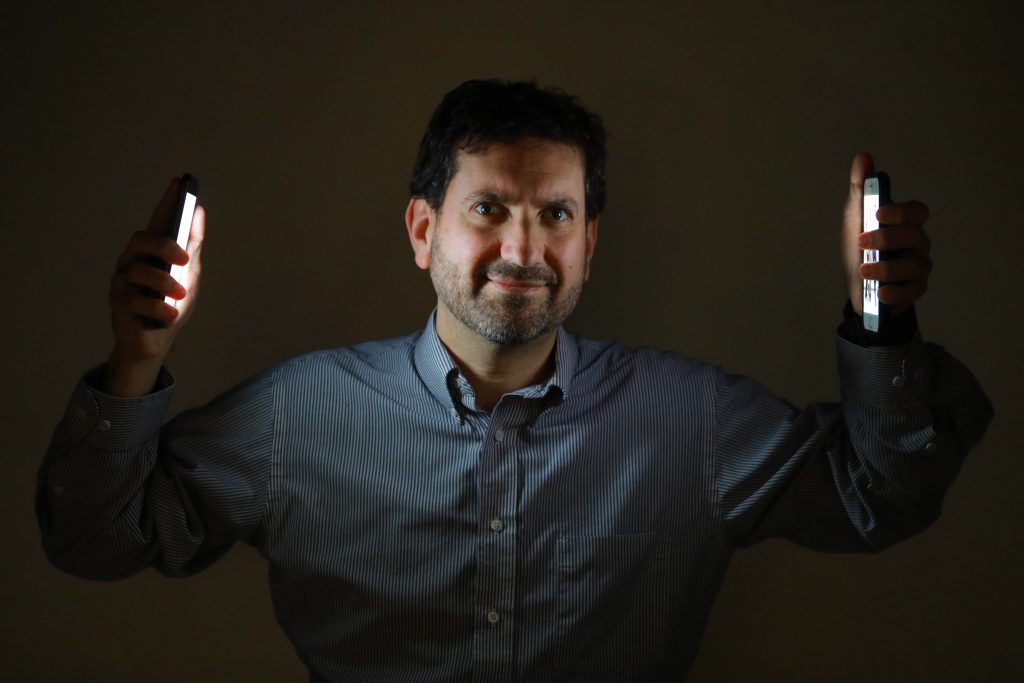Waking up with a tickle in your throat or a mild ache in your chest is not a major concern for most otherwise healthy people. But for individuals prone to serious health anxiety, any unexpected sensation can be interpreted as a sure sign of something serious — even deadly.
Dr. Jon Elhai, a professor of psychology at The University of Toledo, has spent the last year studying health anxiety and the COVID-19 pandemic, looking at predictors of who is most likely to experience anxiety about COVID-19 and how the condition intersects with other anxieties and behaviors, such as fear of missing out and problematic smartphone use.

In a study of health anxiety and the pandemic, Dr. Jon Elhai, a UToledo professor of psychology, found those conditions may intersect with other anxieties and behaviors, such as fear of missing out and problematic smartphone use.
“There are higher levels of anxiety and depression symptoms related to fearing COVID-19, but also as a result of the adverse changes to our routines related to social distancing and lockdown,” Elhai said. “As a result of social distancing and staying at home, we are also using digital technology more in the past year. It’s keeping us from losing social contact entirely and helps us get our work and school done, but can also be a breeding ground for some people to use technology excessively in a way that’s more harmful than helpful.”
Elhai said that some people engage in “problematic” internet use — in that excessive levels of use interfere with their daily functioning, such as social, work or academic performance.
In January, Elhai and an international team of collaborators published a study in the journal Anxiety, Stress and Coping aimed at understanding what drives individuals’ anxieties during the pandemic.
Researchers collected a range of demographic, behavioral and psychological data from more than 900 survey participants in China in the months immediately following the emergence of the virus. Using machine learning, the team analyzed more than a dozen unique factors to determine what best predicts heightened anxiety of COVID-19.
Surprisingly, there was little correlation between COVID-19 anxiety and factors such as advanced age — a known risk factor for more serious illness from COVID-19 — and news exposure about the virus or even an individual’s own perceived threat of death from the virus.
Instead, the analysis found stress, in general, was the strongest predictor of COVID-related anxiety. And health anxiety was the strongest predictor of fearing death from COVID-19.
“It’s not just a fear that you may die from COVID-19; it’s also about everyday stresses and the inconveniences that impact on your daily life,” Elhai said. “For example, having to set an appointment to buy groceries, not being able to eat in a restaurant, see friends or go to a bar for a drink. These are all things that make people anxious this year.”
In addition to heightened health anxiety, the social isolation and stress the pandemic has brought to our overall routine is driving excessive technology use.
Elhai also was part of a team that published a study in February in the journal Human Behavior and Emerging Technologies characterizing the relationship between health anxiety, problematic smartphone and gaming use, and fear of missing out. This research showed that health anxiety and a fear of negative consequences from COVID-19 are associated with increased severity of problematic smartphone and gaming use, particularly in those who experience fear of missing out alongside health anxiety.
As health anxiety increases, individuals are less likely to seek out in-person socialization for fear of contracting COVID-19. Because of that, there appears to be a strong connection between worries about COVID-19, fear of missing out and problematic internet usage.
“In normal times before the pandemic, if you were someone who often feared missing out on social experiences, you could satisfy that fear by going out and meeting with your friends,” Elhai said. “During the pandemic it’s harder to satisfy that fear of missing out because of the need to limit social contact. The risk is that, rather than using technology in an adaptive way, some are excessively engaging in internet use as an unhealthy coping mechanism.”